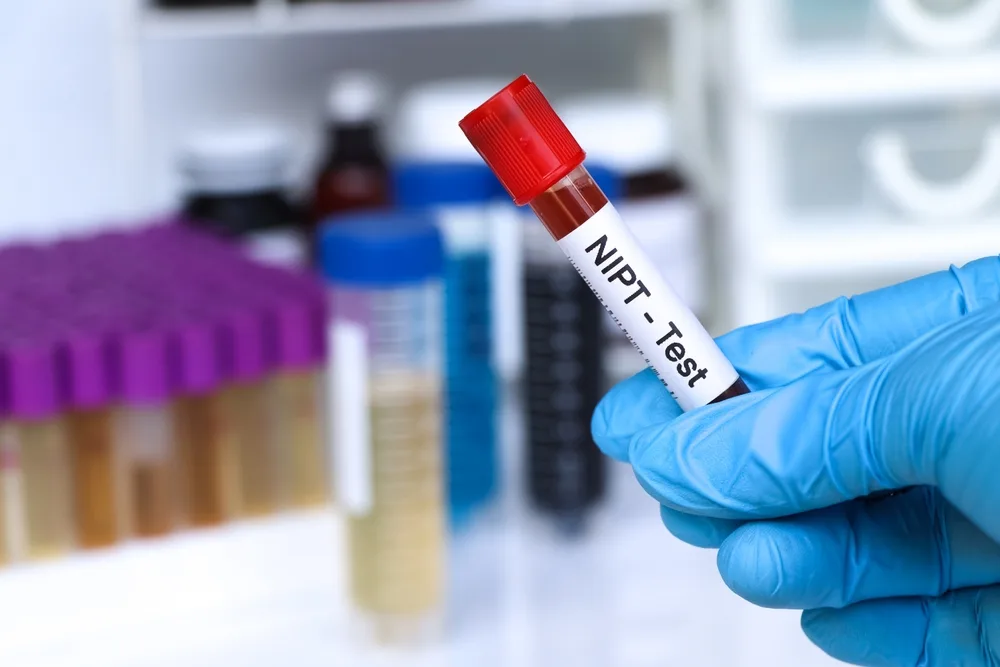Advanced Prenatal Screening
Non-Invasive Prenatal
Testing (NIPT/NIPS)
Secure the earliest, most accurate screening for your baby’s health in Mumbai & Navi Mumbai. Precision diagnostics for Down syndrome, Trisomy 13 & 18, delivered with expert care.
Book Your Screening

Early Answers, Peace of Mind.
What is NIPT/NIPS?
Non-Invasive Prenatal Testing (NIPT or NIPS) is a revolutionary screening method that analyzes cell-free fetal DNA (cffDNA) found in the mother’s blood. This test offers the highest sensitivity for detecting common chromosomal conditions like Down Syndrome (Trisomy 21), Edwards Syndrome (Trisomy 18), and Patau Syndrome (Trisomy 13) from as early as 10 weeks gestation.
Transparent NIPT Panel Options

ADVANCE PANEL
NIPT/NIPS With Microdeletion
- ✅ 22q11.2 deletion (DiGeorge Syndrome)
- ✅ 1p36 deletion syndrome
- ✅ 5p- deletion (Cri-du-chat)
- ✅ 15q11-q13 (Angelman/Prader-Willi)
- ✅ 4p- deletion (Wolf-Hirschhorn Syndrome)
🕒 Turnaround Time: 10–14 working days
₹ 18,500
Select & Consult
STANDARD PANEL
Basic NIPT/NIPS Test
- ✅ Trisomy 21 (Down Syndrome)
- ✅ Trisomy 18 (Edwards Syndrome)
- ✅ Trisomy 13 (Patau Syndrome)
- ✅ Sex Chromosomes (X/Y Aneuploidies)
🕒 Turnaround Time: 5–10 working days
₹ 13,500
Book This Panel
COMPREHENSIVE PANEL
Ultimate NIPT/NIPS Test
- ✅ Basic and Advanced Coverage
- ✅ Rare Autosomal Aneuploidies (RAAs)
- ✅ All Sex Chromosome Aneuploidies
- ✅ Full Microdeletion Syndrome List
🕒 Reports: 7–12 Days
₹ 15,000+
Inquire for PricingYour Gateway to Licensed Diagnostic Care in Mumbai & Navi Mumbai
Henotic Diagnostics is a **licensed diagnostic center in Kharghar, Navi Mumbai**, offering a comprehensive range of in-house services, including blood tests, ECGs, and full-body health checkups. We also function as a user-friendly online platform for booking diagnostic services at our **licensed partner centers** across Mumbai and Navi Mumbai.
We provide access to comprehensive and licensed diagnostic care through our services encompassing:
Advanced Imaging
Sonography, CT scan, MRI scan, PET scan, and DEXA bone scans.
Specialized Cardiac Care
2D Echo, TMT, Holter monitoring, angiography, and angioplasty.
Women’s Health & NIPT
Obstetric ultrasound, anomaly scan, mammography, and prenatal NIPT/NIPS tests.











Locate Our Accredited Partner Centers
Search our network of licensed labs and hospitals across Mumbai and Navi Mumbai for the specific service you need.
No Partner Labs Found
Please try adjusting your search terms or selecting a broader area.
Precision Screening: NIPT by Next-Gen Sequencing (NGS)
Our process leverages cutting-edge NGS technology for unparalleled accuracy and speed in prenatal screening. Safe, non-invasive, and reliable.

1. Sample Collection
A small blood sample is collected from the pregnant mother (after 10 weeks). This procedure is entirely non-invasive and risk-free.

2. NGS Analysis
Fetal DNA is isolated and sequenced using Next-Generation Sequencing (NGS), providing millions of data points for chromosomal counting.

3. Confidential Report
Specialized bioinformatic software generates a detailed, confidential report (5–14 days) shared directly with you and your healthcare provider.
Why Expectant Parents Choose Henotic
We are dedicated to combining cutting-edge technology with compassionate support. Our standards of quality ensure peace of mind during your pregnancy journey.
Specialized NIPT Expertise
Our medical team focuses exclusively on genetic screening for accurate, validated results and interpretation.
NGS Technology Precision
We utilize advanced Next-Generation Sequencing (NGS) to achieve clinically proven results with >99% accuracy.
Qualified Genetic Counseling
Certified professionals provide clear, confidential support before and after testing, ensuring informed decisions.
NABL-Certified Standards
Our lab facilities adhere to stringent NABL quality standards for reliable and dependable diagnostics.
Trusted by Expectant Mothers and Doctors
Hear directly from those who chose Henotic for their prenatal care.
“Henotic Diagnostics gave us clarity and peace of mind with their NIPT service. The process was smooth, professional, and reassuring.”
MARIA EVE
Lawyer
“I was referred here for a NIPT test during my pregnancy. The staff was courteous, the home collection was convenient, and the results came fast.”
LIAM BOWER
Mechanic
“As a gynecologist, I regularly refer patients to Henotic for prenatal screening. Their NIPT accuracy and care make them stand out.”
NICKY
Dancer
